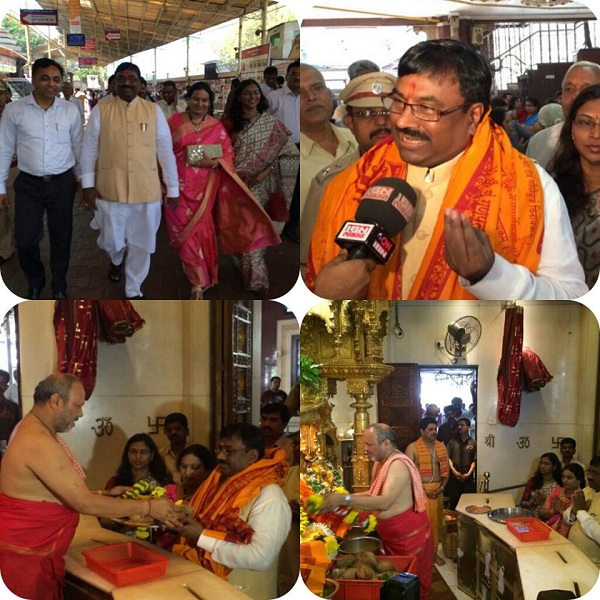
Maharashtra Budget: Enhanced VAT to replace Local Body Tax

State Finance Minister Sudhir Mungantiwar visited Siddhivinayak Temple before presenting the first budget of a BJP-led Maharashtra. Photo Courtesy Facebook
Mumbai: Maharashtra on Wednesday announced Local Body Tax (LBT) would be abolished from August 1 and extended tax exemption on essential commodities like rice and wheat in Budget 2015-16.
As regards LBT, a compensation of Rs. 6,875 crore will be given to the municipal corporations, excluding Mumbai. This was one of the main electoral promises of the BJP.
The loss of revenue would be compensated by enhancing the rate of tax under VAT which will be applicable to the whole state, Maharashtra Finance Minister Sudhir Mungantiwar told the Assembly while presenting his maiden budget in the state Legislature in Mumbai.
A revenue neutral rate has been recommended considering the share of increased tax collection to be given to the areas where LBT is not levied, he said adding that extensive deliberations are required on enhancement of tax rates under VAT.
The Mumbai municipal corporation gets substantial revenue by levying octroi on crude oil. The octroi amount is collected by oil companies as part of the state specific duty from all consumes in the state. This aspect is also required to be taken into account, the minister said.
The total plan size of the state is Rs. 54,999 crore and the budget estimates for 2015-16 are Rs. 1,98,230.50 crore.
As per the estimates, the revenue deficit would be Rs. 3,757.40 crore.
Mr. Mungantiwar, who presented a surplus budget of Rs. 107.10 crore, also announced tax proposals which are estimated to result in net revenue gain of Rs. 643 crore, which has been incorporated in the budget estimates of 2015-16.
He proposed a levy of 5 per cent entry tax on long steel, 12.5 per cent tax on all types of wood-free plain and pre-laminated particle boards.
He also announced extension of tax exemption on essential commodities like rice, wheat, pulses and their flour, turmeric, chillies, tamarind, jaggery, coconut, dates, Solapuri chadars and towels upto March 31, 2016.
The tax exemption on currants and raisins as well as 5 per cent tax on tea will also continue till March 31, 2016.
The Minister said that women drawing salary up to Rs. 10,000 per month will not have to pay professional tax. This will benefit nearly 1.5 lakh women in the state.
He also proposed to reduce sales tax on ladies’ purse and handbags from 12.5 per cent to 5 per cent.
Besides, work books, graph books, drawing books and laboratory books for students have been made tax-free.
The rate of excise duty on country liquor would now be 200 per cent of the manufacturing cost or Rs 120 per proof litre, whichever is higher.
Certain medicines required for treatment of cancer will also be exempted from tax and a list of such drugs would be notified separately.
Mr. Mungantiwar also proposed to reduce tax on guide wire required for medical treatment and LED bulbs from 12.5 per cent to 5 per cent.
Mr. Mungantiwar said new automation project for sales tax has been started which will help business and the sales tax department in further simplification of procedures.
All the processes envisaged under the GST are being incorporated in the new software system under development, so it will make hassle-free migration of data of existing tax payer to the new GST system.
He also announced enhancing premium on additional FSI which will result in substantial revenue gains.
The minister said the government has promised to enhance the FSI limit from 0.33 to 0.60 and increase the rate of premium in Brihanmumbai Municipal Corporation limit. It is also under consideration of the government to enhance the rate of premium on grant on all kinds of FSI.
These gains in FSI will benefit individuals, but the government does not get benefit of revenue increase in the same proportion.
These amendments are proposed to ensure legitimate share of revenue for the government from overall benefits accruing to the beneficiaries of the FSI without burdening the common man, he said.
The government intends to grant timely permissions, simplify procedures and charge legitimate premium on additional benefits.
As part of the amendments in the Maharashtra Value Added Tax Act, there will be no VAT on service tax and late fee for VAT return will be reduced from Rs. 2,000 to Rs. 1,000.
Similarly, multiple revised returns in case of audit findings or investigation proceedings by sales tax authorities would be allowed. Assessment can be initiated if there is reason to believe that the tax payer is not correctly discharging tax liability or is attempting to evade tax on any transaction.
The Finance Minister also proposed to introduce time limit for completion of transaction-wise assessment and also provide for cancellation of order, if it is done ex-parte.
Computation of interest in case of a revised return filed for a period less than a year is also proposed.
After the High Court approves merger or demerger of companies, a period of 30 days will be specified for making an application for registration from the date of notification by the registrar of companies, he added.

